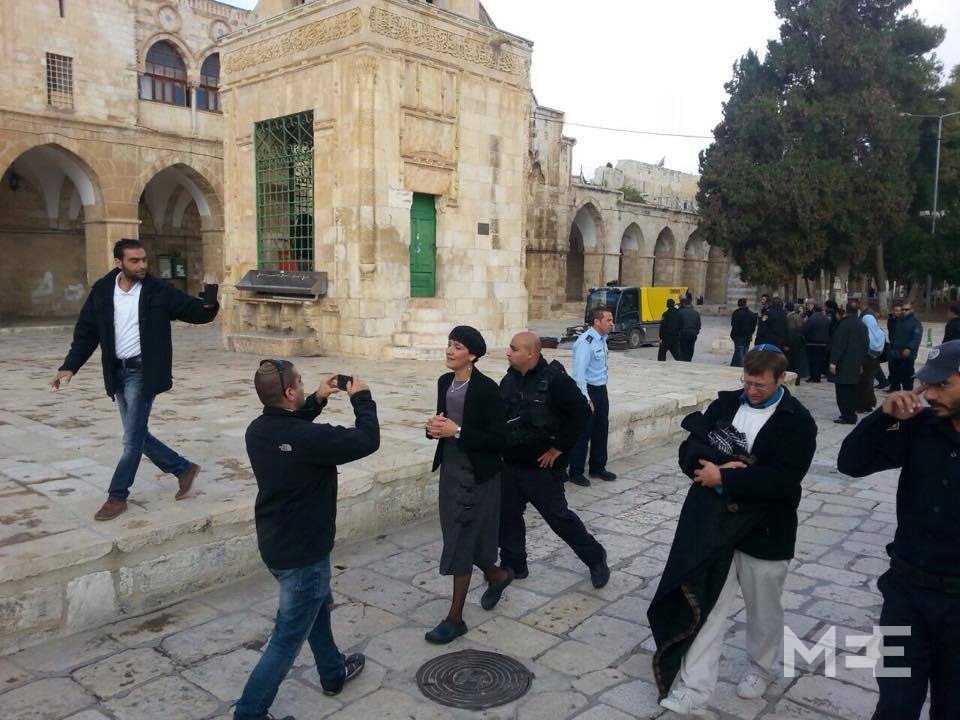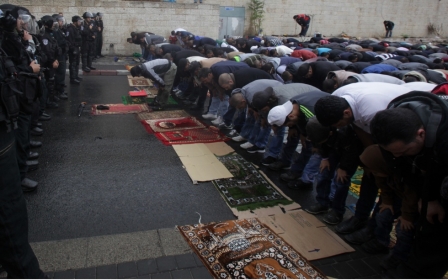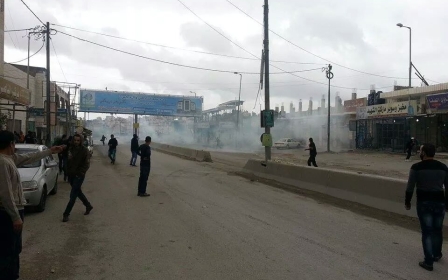In photos: Israeli politician allegedly 'pushed' after al-Aqsa skirmish

A skirmish broke out on Monday in the al-Aqsa Mosque compound when a group of around 20 Israelis, together with a right-wing Knesset member, entered the area with heavy Israeli security, according to eyewitnesses.
The Knesset member, Shuli Moalem-Refaeli from the far-right Bayit Yehudi (Jewish Home) party, claimed in an interview with Israel's Military Radio that she was pushed by a Palestinian woman who had come to pray during the visit, although she was not harmed during the incident.
Israeli police later arrested Sahar Alnatsha, a Palestinian woman accused of pushing Moalem-Refaeli.
Alnatsha is part of a group of Palestinian women who live in Jerusalem's Old City and visit the al-Aqsa Mosque complex daily, often arriving around the time of the first morning prayer at 5 am.
Al-Aqsa represents the world's third holiest site for Muslims while Jews refer to the area as the Temple Mount, believing it to be the site of two ancient Jewish temples.
Can we say Jews are allowed to enter but not pray in the compound, with access to Haram al-Sharif prohibited to all non-Muslims.
Muslims access to al-Aqsa is regularly limited to women and Muslim men over the age of 40 or 50, particularly at times of political tension. In addition to restricted access to al-Aqsa, Muslims in Jerusalem regularly report being targeted as they enter and exit other places of worship in the city. The group of women at al-Aqsa came together, leader Ayda Sedawi told MEE, because they feel it is their duty to protect the mosque.
"Extreme people are breaking into al-Aqsa almost everyday and that's provoking our feelings because the Aqsa is an Islamic symbol," Sedawi said on Monday, referring to right-wing Jews who lobby for rights to pray in al-Aqsa and often try to storm barriers, despite this being illegal under Israeli law.
On Sunday, another member of the Knesset, Moshe Feiglin, entered the al-Aqsa complex, also surrounded by Israeli soldiers and police.
For the first time in many years, the al-Aqsa complex was closed last Thursday, following heightened tensions in Jerusalem after the attempted assassination of Yehuda Glick followed by the killing of suspected shooter Mu'taz Hijazi. The complex was re-opened on Friday, although it remains closed to Muslim men under the age of 40, according to Ma'an News agency.
New MEE newsletter: Jerusalem Dispatch
Sign up to get the latest insights and analysis on Israel-Palestine, alongside Turkey Unpacked and other MEE newsletters
Middle East Eye delivers independent and unrivalled coverage and analysis of the Middle East, North Africa and beyond. To learn more about republishing this content and the associated fees, please fill out this form. More about MEE can be found here.



